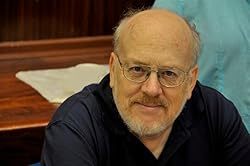MJN: As an army veteran. Israeli culture has a very
strong militant slant, given that Israel is surrounded by enemies. Do you
regard yourself as a writer with a military background or as a soldier who
writes? Which professional identity is primary for you?
RS: I am certainly NOT a
soldier who writes, since most people here have spent time in the military. I
like to think of myself as a writer, though for now, I can't say I'm really a
professional as I am not earning enough to stop doing everything else! Military
service influences or affects everyone who has served, but in different ways. I
have some very good memories, and some notable ones, and some that I would
really like to forget but can't. I probably should say I'm a professional
Israeli - that is my identity, for better or for worse.
MJN: Being of German Jewish
descent, you are undoubtedly aware that you are lucky to be in this world - as
we are lucky to have you with us. The fact that you came into existence in the
first place is a miracle. My grandfather was a German Jew. Unlike your parents,
he took refuge not in the USA but in the former USSR. Do you ever wonder what
would have happened if your parents had taken refuge in another country, like
South Africa?
RS: I haven't really spent
time thinking about the 'what if' about my parents. They were lucky to
get out, but they were deeply affected, and damaged by what they escaped from.
I hate to think what would have happened if they had gone to SA, they would
probably have both been 'banned' or had to escape (again) or something like
that. The old regime there would have been intolerable for them.

MJN: You were born in the US and spent your early life in New York. Can you highlight some of the cultural differences between Jewish Americans and the Israelis?
RS: Wow. This would need a
book or two to develop! Especially since Israeli culture has changed immensely
in the years since I arrived here. The early years were characterized by a
'pioneer' culture, hard working, anti-materialist and very moral (by their
definitions at least). Today, the culture is much,much more materialistic, and
in many ways approaching America. Too close for my liking. American culture in
the 50s and 60s, before I left, was also very different from what it is today.
Jewish American culture has not changed all that much since then, though the
religious trend of a large part of that population is very different from what
I knew as a child. Back then, Zionism in the USA was not automatically accepted
as a 'given' by the Reform and Conservation Jewish congregations.
I have a good friend from when we were kids together over 50 years ago, and he often mentions in his letters that he feels we were very lucky to have grown up when and were we did. (We moved out of NYC to the suburbs when I was 10, and I often told my children that my life began on the day we moved.) He's not Jewish, but I agree with him - growing up in the suburbs of NYC in those years was idyllic.
I have a good friend from when we were kids together over 50 years ago, and he often mentions in his letters that he feels we were very lucky to have grown up when and were we did. (We moved out of NYC to the suburbs when I was 10, and I often told my children that my life began on the day we moved.) He's not Jewish, but I agree with him - growing up in the suburbs of NYC in those years was idyllic.
MJN: When you watch films about the Holocaust, do you scrutinize them for historical accuracy?

RS: A) I don't watch films
about the Holocaust - I don't need them and I have enough memory about what I
was told and taught as a child. B) I scrutinize ALL films I see and ALL books I
read for historical accuracy. It's a 'thing' with me, I can't stand the
mistakes and don't understand why they occur, especially considering how easy
it is to check historical facts these days, with Wikipedia and the like. It's
pure laziness, on the part of the writers/producers, or they just think they know
everything - which is even worse!
MJN: Do you believe in the concept of collective
memory? This is going to sound weird, but as a child I had Holocaust-themed
nightmares, long before I became aware of the German-Jewish history. Do you
think that certain archetypal fears that exist in our psyche?
RS: I don't believe in
collective memory, but your nightmares may well be the result of things you
overheard and don't remember hearing. Memory is a strange thing, and not always
understandable.

No comments:
Post a Comment